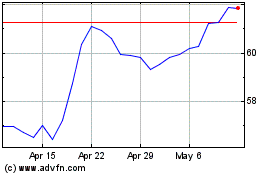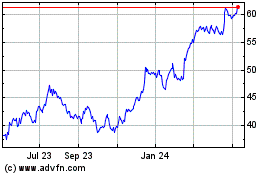Citigroup Holders Approve Pay Plan -- WSJ
April 26 2017 - 3:03AM
Dow Jones News
By Telis Demos
Citigroup Inc. shareholders cast 95% of their votes at Tuesday's
annual meeting in support of the bank's compensation plan for top
executives, following a jump in the stock price and a pay cut for
Chief Executive Michael Corbat.
That reversed tepid support last year when the bank's annual
"say on pay" resolution received 64% of votes cast. The average
bank in the S&P 500 index received 91% support, according to
proxy advisory firm Institutional Shareholder Services Inc.
In contrast to a rancorous Wells Fargo & Co. annual
shareholder meeting that also took place Tuesday, Citigroup's
conclave was relatively placid. But it wasn't totally uneventful:
There was one major interruption when a group took the stage at the
Cooper Union hall in New York City for a few minutes to protest the
bank's lending related to the controversial Dakota Access
Pipeline.
Otherwise, Citigroup shareholders backed the bank's overall
strategy, overwhelmingly rejecting a breakup proposal. The current
board of directors also received more than 98% support from voters.
The breakup measure got 2.5% of votes cast, down from 3.5% last
year.
A more extensive debate on the bank's performance could await
Citigroup in July when it will hold its first investor day meeting
in several years.
The bank succeeded in tamping down the major concern at last
year's meeting, executive pay. Following last year's say-on-pay
vote -- which isn't a binding measure, but an indication of
shareholder support -- Citigroup's board made a handful of
changes.
For one, it cut Mr. Corbat's pay. For 2016, Mr. Corbat is
expected to receive total compensation of $15.5 million, a 6%
decrease from the previous year.
That helped the bank match up more favorably with its stock
performance and peers. The cut came despite Citigroup stock
generating a 16% total return in 2016, from negative 4% in 2015,
when Mr. Corbat's pay rose.
Last year, proxy advisory firms Glass Lewis & Co. and ISS
recommended that shareholders vote against the say-on-pay
resolution. This year, both firms recommended voting in favor,
citing the measures the bank took after last year's vote.
"The board has demonstrated sufficient responsiveness," ISS said
in a report this month.
Like most big banks, Citigroup's stock has jumped since the U.S.
presidential election, in part on hopes that the Trump
administration will give firms a wider berth to return capital.
Citigroup returned $11 billion to shareholders last year, and
expects to increase that number. Mr. Corbat told shareholders that
Citigroup pressed the case for a bigger payout when the bank made
its 2017 stress-test submission to regulators.
The company made other changes after the 2016 vote, including
shifting more pay from cash to stock, and basing future
performance-based stock grants in part on 2019 return on capital
and profitability.
Mr. Corbat acknowledged that the bank fell short on several
measures in 2016, such as a decline in net income and a drop in
return on assets. He said that was driven by decisions to make new
investments in several areas, including credit cards, consumer
banking in Mexico, and stock trading, which will generate faster
growth and capital return.
"We have a clear path to producing better returns in the
future," he said.
Write to Telis Demos at telis.demos@wsj.com
Corrections & Amplifications Citigroup returned $11 billion
to shareholders last year. An earlier version of this article
incorrectly stated that it returned $2.2 billion. (April 25)
(END) Dow Jones Newswires
April 26, 2017 02:48 ET (06:48 GMT)
Copyright (c) 2017 Dow Jones & Company, Inc.
Wells Fargo (NYSE:WFC)
Historical Stock Chart
From Aug 2024 to Sep 2024

Wells Fargo (NYSE:WFC)
Historical Stock Chart
From Sep 2023 to Sep 2024
